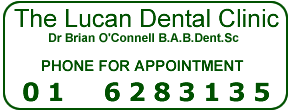Tooth Decay

What is tooth decay?
Dental decay is a gradual but avoidable process when teeth are dissolved away by acid produced in the mouth by bacteria. Everyone's teeth are covered in plaque which is made up of millions of bacteria. When sugary foods are eaten, or sugary drinks taken, the bacteria feed on the sugar and release acid, which dissolves the teeth.
How can tooth decay be stopped?
Decay can be prevented by establishing good dietary habits and cutting down on sugar intake and by good mouth care including regular tooth brushing with a fluoride based toothpaste and the use of aids to clean between teeth like dental floss.
How can your dentist help?
Your dentist should check for decay at every check-up by careful visual examination and gentle probing of the teeth and it is recommended that x-rays are taken at regular intervals to look for early decay between the teeth. If very early signs of dental decay are present then your dentist can spot these and advise you how to avoid a filling being necessary. However if your dentist detects decay at a later stage then it can be treated by a small simple filling which can be tooth coloured. Often early decay is not at all painful and so your dentist can detect it before you are aware of symptoms. Unfortunately if decay is left to progress for too long then it begins to cause symptoms of pain as the cavity and the progess of tooth destruction proceeds towards the nerve in the tooth. If it is detected before reaching the nerve then the larger cavity can usually be filled but sometimes a crown will be required.
What happens of decay is not treated?
If the decay reaches the nerve of the tooth then the nerve is likely to become infected and, apart from possibly being very painful, an abscess will form. At this stage the tooth will require root canal treatment. If you regularly see your dentist then decay should almost always be detected before it reaches the nerve of the tooth and so the need for costly and lengthy root canal treatment should be avoided. Everyone is potentially affected by tooth decay and some people are more at risk that others. You can prevent problems with decay by looking after your teeth, being careful about how much sugar you eat and drink and visiting your dentist for regular check ups.




